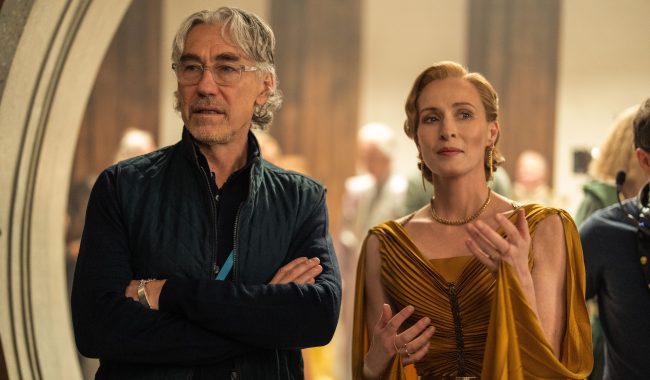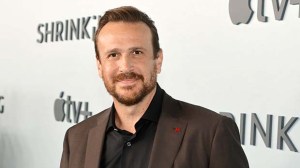For fans of the Star Wars series Andor, few Emmys snubs stood out more on nominations morning than the missing nods for lead Diego Luna in the title role and season-standout Genevieve O’Reilly as Mon Mothma in the supporting race.
Creator Tony Gilroy was among those sorely disappointed.
Despite the show’s award success in its second and final second — including nominations for Best Drama Series, Writing, Directing, and Guest Actor for Forest Whitaker — the accolades failed to highlight all of the stellar work that Gilroy saw on the show.
In a candid conversation with Gold Derby, Gilroy reflects on his awards history (including running the entire film circuit with Michael Clayton in 2007-08), what nominations mean to him, and whether Andor was as political as some online trolls complained.
Gold Derby: You’ve been through the awards circuit with Andor Season 1 and, before that, with Michael Clayton. What are your feelings about awards in general?
Tony Gilroy: I grew up watching [awards shows]. They seemed really important when I wasn’t involved in the movie business. I watched a couple people early in my career who I thought were bending their careers in a really warp-y way to play to it and making non-creative decisions to chase it. So, like any rational person, I was thinking, “Judging art and competing art and subjective awards?” and all the cynical things that go with it. When we went through it with Clayton, one of the really cool things about it was because we took the full ride. It was the year of the strike, and we were trying to shut down the Academy Awards that year. And we did shut down the Golden Globes. Very complicated, very heady year, and it was a great class of people to be with. I felt like when it was all over, I wasn’t unhappy with what happened at all. And I felt like it gave me a really legitimate place to have an honest opinion about it for the rest of my life.
For all of Andor’s great success with this year’s nomination, the show also had two of the most notable snubs, in Diego Luna and Genevieve O’Reilly. How do oversights like that feel from inside a show?
It’s really painful. Genevieve O’Reilly, of the 24 episodes, she must be in 20 of them. She gives a five-year performance that’s complicated, nuanced, and breathtaking. It’s a lifetime achievement. I’m sure when you’re looking [at the nomination, you think], “When are you going to get a part like that again? When are you going to get an opportunity like that again? When are you going to ever do that kind of work again?” Especially, if you’ve been a working actor, but always on the margins, always down that list. And here’s this incredible opportunity. And really, I would trade away a lot of other things to have her there. Diego, the same thing, but I worry less about him. It’s about what [awards] can do for you and the utility of it. There are people where it will really change things for them, and they’ve done the best work they may ever do in their lifetime, and they’re going, “Why didn’t it happen?”… It really hurts, but I said it before: I do think the performances and the work that people did on the show is going to have a very long, a very long life. I don’t think it has an expiration date on it that is anytime soon.
A particularly toxic portion of the online discourse around Season 2 was driven by people who thought the series had politicized Star Wars. What makes a piece of art political, in your eyes?
I’ve been corralled into identifying and articulating what my political worldview might be over the past six months. And in the beginning, I was trying to evade and deflect to try to stay as anonymous as possible along the way. As it became increasingly difficult, over hundreds of conversations, I found myself bringing forward what I would identify as my own political beliefs, which — I really believe — are more moral than left and right or up and down. The things that we’re dealing with in the show can be viewed in an absolutely moral sense, rather than a political one. I find that the elevation of cruelty, the diminishment of grace. Fascism and authoritarianism, as it is in the show, inevitably strips away freedom or freedom, but it also strips away decency and the qualities of humanity that I hold valuable.
It’s interesting. As much as everybody [in Andor] is coalescing around the rebellion and the revolution, you don’t have anybody ever really articulating what their version of the post-revolutionary world should look like. There are people that disagree, but we never get into their ideologies. We’re not talking about tax theory here, and I’m not talking about free market economy or supply-side. My feeling is, in the current environment, we’ve moved past the political into the moral. … When you move past politics into morality, something is really epically, globally wrong.
In addition to being nominated for Best Series, you also have a nod for Original Music and Lyrics alongside Nicholas Britell for “We Are the Ghor.”
Yes! I want this. I want this Emmy really badly. You could say that I’m smiling, but yeah, I want this one.
You were a musician, right?
I played music really seriously for quite a few years, but it didn’t work out for me. I made a very brave career shift. When Nick and I started writing, we listened to a lot of national anthems from around the world. There’s some great ones, and there’s some really sh-tty ones. I think [anthem writing] is a good shingle we could open up. If people want to trade up and get a new anthem, it could be a good side hustle.



